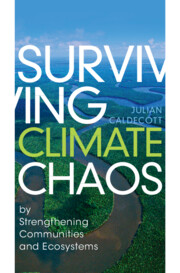Book contents
- Surviving Climate Chaos
- Surviving Climate Chaos
- Copyright page
- Dedication
- Contents
- Preface
- Acknowledgements
- Part I Context, Tools and Systems
- Part II Understanding Climate Chaos
- Part III Practical System Strengthening
- Part IV Global Perspectives
- Part V Conclusions
- 12 Designing and Evaluating Adaptation Investments
- 13 Adaptive Thinking, Feeling and Acting
- Abbreviations and Acronyms
- References
- Index
13 - Adaptive Thinking, Feeling and Acting
from Part V - Conclusions
Published online by Cambridge University Press: 02 September 2021
- Surviving Climate Chaos
- Surviving Climate Chaos
- Copyright page
- Dedication
- Contents
- Preface
- Acknowledgements
- Part I Context, Tools and Systems
- Part II Understanding Climate Chaos
- Part III Practical System Strengthening
- Part IV Global Perspectives
- Part V Conclusions
- 12 Designing and Evaluating Adaptation Investments
- 13 Adaptive Thinking, Feeling and Acting
- Abbreviations and Acronyms
- References
- Index
Summary
Mitigation and adaptation pose different challenges to thinking, but hope or purpose are always needed to prevent despondency. Signs of a Zeitgeist shift on mitigation offer hope, while the goal of peace with nature is an emergent source of purpose. Take-home messages are offered to potential reader groups. For the UNFCCC Secretariat, to consider practical yet holistic ways to monitor progress towards a sustainable human–biosphere relationship. For governments, to validate community-based and ecosystem-based adaptation and their co-benefits, and the use of community networks to build country-wide and city-wide strengths. For aid institutions, to use a systems approach in designing and evaluating adaptation investments, while promoting local system strengthening and networking. For students, researchers and teachers, to focus on and understand complex systems where the life and social sciences overlap, using adaptation communications as a knowledge resource, and appreciating the birth of the Anthropocene as an extraordinary moment in human history. And for people everywhere, to act knowing that small groups, partnerships and networks are potent and necessary to everyone for surviving climate chaos. With these sources of purpose, hope and realism, we can perhaps adapt to an unstable biosphere and survive climate chaos.
Keywords
- Type
- Chapter
- Information
- Surviving Climate Chaosby Strengthening Communities and Ecosystems, pp. 308 - 323Publisher: Cambridge University PressPrint publication year: 2021



